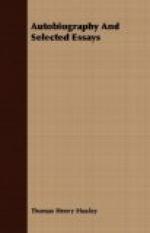To every one of us the world was once as fresh and new as to Adam. And then, long before we were susceptible of any other modes of instruction, Nature took us in hand, and every minute of waking life brought its educational influence, shaping our actions into rough accordance with Nature’s laws, so that we might not be ended untimely by too gross disobedience. Nor should I speak of this process of education as past for any one, be he as old as he may. For every man the world is as fresh as it was at the first day, and as full of untold novelties for him who has the eyes to see them. And Nature is still continuing her patient education of us in that great university, the universe, of which we are all members—Nature having no Test-Acts.[54]
Those who take honours in Nature’s university, who learn the laws which govern men and things and obey them, are the really great and successful men in this world. The great mass of mankind are the “Poll,"[55] who pick up just enough to get through without much discredit. Those who won’t learn at all are plucked;[56] and then you can’t come up again. Nature’s pluck means extermination.
Thus the question of compulsory education is settled so far as Nature is concerned. Her bill on that question was framed and passed long ago. But, like all compulsory legislation, that of Nature is harsh and wasteful in its operation. Ignorance is visited as sharply as wilful disobedience—incapacity meets with the same punishment as crime. Nature’s discipline is not even a word and a blow, and the blow first; but the blow without the word. It is left to you to find out why your ears are boxed.
The object of what we commonly call education—that education in which man intervenes and which I shall distinguish as artificial education—is to make good these defects in Nature’s methods; to prepare the child to receive Nature’s education, neither incapably nor ignorantly, nor with wilful disobedience; and to understand the preliminary symptoms of her pleasure, without waiting for the box on the ear. In short, all artificial education ought to be an anticipation of natural education. And a liberal education is an artificial education which has not only prepared a man to escape the great evils of disobedience to natural laws, but has trained him to appreciate and to seize upon the rewards, which Nature scatters with as free a hand as her penalties.
That man, I think, has had a liberal education who has been so trained in youth that his body is the ready servant of his will, and does with ease and pleasure all the work that, as a mechanism, it is capable of; whose intellect is a clear, cold, logic engine, with all its parts of equal strength, and in smooth working order; ready, like a steam engine, to be turned to any kind of work, and spin the gossamers as well as forge the anchors of the mind; whose mind is stored with a knowledge of the great and fundamental truths of Nature and of the laws of her operations; one who, no stunted ascetic, is full of life and fire, but whose passions are trained to come to heel by a vigorous will, the servant of a tender conscience; who has learned to love all beauty, whether of Nature or of art, to hate all vileness, and to respect others as himself.




